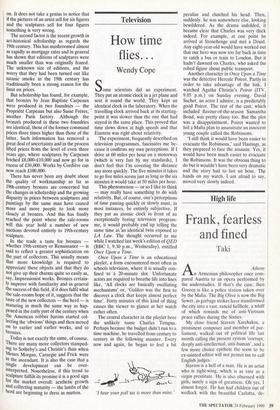Television
How time flies...
Wendy Cope
Some scientists did an experiment. They put an atomic clock in a jet plane and sent it round the world. They kept an identical clock in the laboratory. When the travelling clock arrived back at its starting- point it was slower than the one that had stayed in the same place. This proved that time slows down at high speeds and that Einstein was right about relativity.
The experiment, frequently described on television programmes, fascinates me be- cause it confirms my own perceptions. If I drive at 60 miles per hour on a motorway (which is very fast by my standards), I don't feel that I'm covering the distance any more quickly. The five minutes it takes to go five miles seems just as long as the six minutes it would take at 50 miles per hour.
This phenomenon --or so I like to think — may really have something to do with relativity. But, of course, one's perceptions of time passing quickly or slowly must, in most instances, be entirely subjective. If they put an atomic clock in front of an exceptionally boring television program- me, it would probably end up telling the same time as 'an identical twin exposed to LA Law. The thought occurred to me while I watched last week's edition of QED (BBC 1, 9.30 p.m., Wednesday), entitled Once Upon a Time.
Once Upon a Time is an educational playlet, a form encountered most often in schools television, where it is usually con- fined -to a 20-minute slot. Unfortunate actors are required to breathe life into lines like, 'All clocks are basically oscillating mechanisms' or, 'Galileo was the first to discover a clock that keeps almost perfect time'. Forty minutes of this kind of thing causes the viewer to glance at her watch rather often.
The central character in the playlet bore the unlikely name Charles Tempus. Perhaps because the budget didn't run to a time machine, he travelled from century to century in the following manner. Every now and again, he began to feel a bit 'I hear your poll tax is more than mine.' peculiar and clutched his head. Then, suddenly, he was somewhere else, looking bewildered. As the drama unfolded, it became clear that Charles was very thick indeed. For example, at one point he arrived at Stonehenge and met a Druid. Any eight-year-old would have worked out that our hero was now too far back in time to catch a bus or train to London. But it hadn't dawned on Charles, who asked the robed figure about public transport.
Another character in Once Upon a Time was the detective Hercule Poirot. Partly in order to take advantage of the link, I watched Agatha Christie's Poirot (ITV, 9.05 p.m.) on Sunday evening. David Suchet, an actor I admire, is a predictably good Poirot. The rest of the cast, which included flavour-of-the-season Samantha Bond, was pretty classy too. But the plot was a disappointment. Poirot wanted to foil a Mafia plan to assassinate an innocent young couple called the Robinsons.
'I still think it would have been easier to evacuate the Robinsons,' said Hastings, as they prepared to face the assassin. Yes, it would have been much easier to evacuate the Robinsons. It was the obvious thing to do but it wouldn't have been very dramatic and the story had to last an hour. The hands on my watch, I am afraid to say, moved very slowly indeed.


















































 Previous page
Previous page